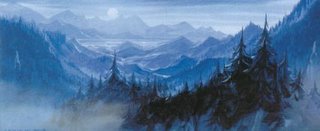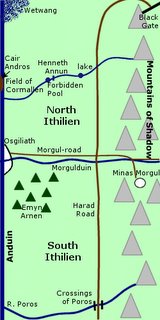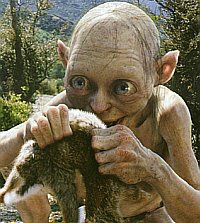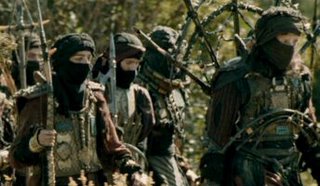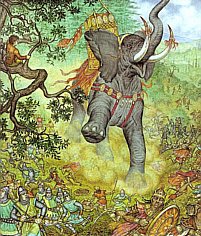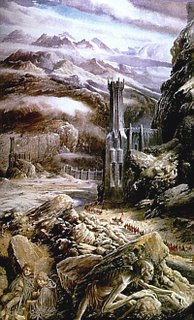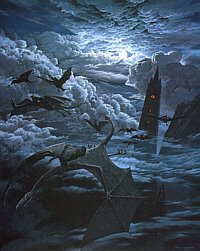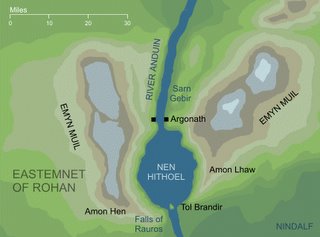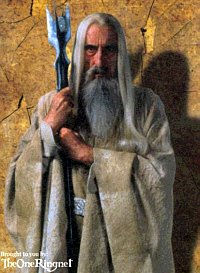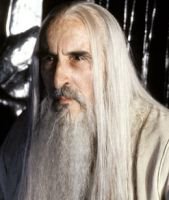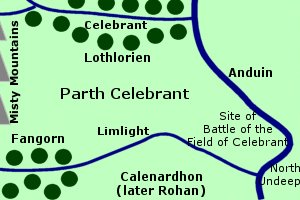TTT: Bk 4, Ch 5
"'I do not ask you to tell me more. I do not even ask you to tell me whether I now speak nearer the mark. But if you will trust me, it may be that I can advise you in your present quest, whatever that may be - yes, and even to aid you.'"At 27 pages, this is the longest chapter of Book Four. Originally, Tolkien had written it longer but ultimately he had to excise much of the part where Faramir recounts the history of Gondor and Rohan. This material was moved to Appendix A. Like "The Council of Elrond", however, this chapter basically comes down to two meetings and the sharing of information. In fact we spend more time finding out about Faramir than we did about his brother.
After the skirmish with the Southrons, the force of Rangers
 gathers in a wide semi-circle and Faramir gives Frodo a decent grilling on the significance of his Quest, especially as it related to "Isildur's Bane". In discussing this hidden "thing" that he carries, Frodo reveals that if anyone has claim to wield it, that person would be Aragorn, the heir of Isildur. When Faramir asks about Aragorn's history and claim to the throne, Frodo insists that Boromir would vouch for him. At this point, remember, Frodo is not aware that Boromir has been killed. When Faramir reveals that he knows Boromir to be dead, Frodo is shocked at the news. And the Gondorian was hoping Frodo could shed some light on the manner of his death.
gathers in a wide semi-circle and Faramir gives Frodo a decent grilling on the significance of his Quest, especially as it related to "Isildur's Bane". In discussing this hidden "thing" that he carries, Frodo reveals that if anyone has claim to wield it, that person would be Aragorn, the heir of Isildur. When Faramir asks about Aragorn's history and claim to the throne, Frodo insists that Boromir would vouch for him. At this point, remember, Frodo is not aware that Boromir has been killed. When Faramir reveals that he knows Boromir to be dead, Frodo is shocked at the news. And the Gondorian was hoping Frodo could shed some light on the manner of his death.At this point, Sam gets a little snotty with Faramir over his line of questioning. But Faramir does not take offense. He is patient and tells the hobbits that he is Boromir's brother. At this point, he explains that eleven days earlier - on February 26, the day of the breaking of the Fellowship - he had heard the horn of Gondor blowing in the distance, a boding of ill will. Three nights later, along the shores of Anduin, he saw a strange boat floating in the river. He waded into the stream, and the boat approached him.
"[It] turned towards me, and stayed its pace, and floated slowly by within my hand's reach, yet I durst not handle it. It waded deep, as if it were heavily burdened, and it seemed to me as it passed under my gaze that it was almost filled with clear water, from which came the light; and lapped in the water a warrior lay asleep."It was Boromir in the Elven boat that was set adrift by Aragorn, Legolas and Gimli. Faramir remembers a "fair belt, as it were of linked golden leaves, about his waist". Faramir insists it was not a dream because there was no waking. And for Faramir to have seen the belt that Galadriel gave to Boromir without having any knowledge of it would be a fair trick. Clearly the Elven boat possessed such properties that allowed it to survive the Falls of Rauros. Faramir feels he should take Frodo to Minas Tirith but is cautious not to decide in haste. He resolves rather to take the hobbits to a secret place nearby.
As they walk, Faramir recounts much of the dealings in Gondor and why there is no King. He
 explains about the Stewards and his memories of Boromir. He tells Frodo that he has guessed the secret of Isildur's Bane, that it was something that belonged to Sauron that Isildur took although he hasn't figured out that it is the One Ring. Frodo is getting nervous but Faramir assures him that although Boromir, anxious for the victory of Minas Tirith, must have been driven by desire for this thing he would not take it "if it lay by the highway. Not were Minas Tirith falling in ruin". He does not love weapons and battles, but only the City of Numenor that they would defend. Faramir shows himself to be in this way very much unlike Boromir.
explains about the Stewards and his memories of Boromir. He tells Frodo that he has guessed the secret of Isildur's Bane, that it was something that belonged to Sauron that Isildur took although he hasn't figured out that it is the One Ring. Frodo is getting nervous but Faramir assures him that although Boromir, anxious for the victory of Minas Tirith, must have been driven by desire for this thing he would not take it "if it lay by the highway. Not were Minas Tirith falling in ruin". He does not love weapons and battles, but only the City of Numenor that they would defend. Faramir shows himself to be in this way very much unlike Boromir.Frodo and Sam are then blindfolded so that they will not be witness to the entrance of the hidden lair, much like the Elves did to them as they entered Lothlorien. They are brought to a place with the sound of running water. As their blindfolds are removed, they get their first view through the waterfall at Henneth Annun.
"They stood on a wet floor of polished stone, the doorstep, as it were, of a rough-hewn gate of rock opening dark behind them. But in front a thin veil of water was hung, so near that Frodo could have put an outstretched arm into it. It faced westward. The level shafts of the setting sun behind beat upon it, and the red light was broken into many flickering beams of ever-changing colour. It was as if they stood at the window of some elven-tower, curtained with threaded jewels of silver and gold, and ruby, sapphire and amethyst, all kindled with an unconsuming fire."
 The view faced westwards towards Osgiliath and Minas Tirith but, symbolically, it also faced westwards towards the sea where Numenor once was as well as the lands beyond which were now no longer reachable.
The view faced westwards towards Osgiliath and Minas Tirith but, symbolically, it also faced westwards towards the sea where Numenor once was as well as the lands beyond which were now no longer reachable.The refuge of Henneth Annun was formed when the water that once flowed through the cavern and out of the "window" arch had its course changed to now flow over the rocks above, forming a waterfall in front of the open space. The only ways out where either through the one secret passage that they had entered or through the arch of the window-curtain down to a pool below filled with sharp rocks. From this secret place and others, the Rangers were able to find safety and hiding as they patrolled the land of Ithilien.
The men and hobbits share a meal and discuss further the decline of Gondor's civilization. Because of the Numenoreans continued hunger for everlasting life, they made tombs more elaborate and stately than houses of the living. They also became more focused on their past than their future. Unfortunately, the hobbits begin to feel too at ease and Sam unintentionally blurts out a reference to the Enemy's Ring. It is here that Faramir finally understands the nature of this "thing" that Frodo is carrying and it puts him in an interesting position. He deduces that Boromir must have tried to take the Ring by force and it led to his death. And now, Frodo finds himself in the control of his brother.
"And here in the wild I have you: two halflings, and a host of men at my call, and the Ring of Rings. A pretty stroke of fortune! A chance for Faramir, Captain of Gondor, to show his quality!"Now almost everything up to this point was portrayed in the film much the same way, with the exceptions of Faramir's earlier declaration of not being interested in this "thing" that Frodo carried, his own guess that Boromir died trying to take it, and the condensing of the "interrogation" of Frodo into one scene at Henneth Annun. However at this point, Peter Jackson made a change that probably caused more uproar among fans than any other one he made. He has Faramir, upon discovering the Ring, initially decide to take the hobbits (and the Ring) back to Minas Tirith, something he was already considering earlier.
Many fans found this to be totally out of character for Faramir as he was written. And on the surface this is certainly true. But let's take a close look at this change for a moment. Faramir does not try to take the Ring for himself. Actually, at first he avoids having to make that decision - to take it or to let it go - by deferring to his father's wishes. Essentially, he is putting off the moment when he will rise to the occasion and "show his quality". By having Faramir head first to Osgiliath, Jackson is creating some character development that I think works pretty well in the film version.
In PJ's The Two Towers, Faramir is conflicted and, feeling no less passionate about the defense of his people than Boromir did, he is not completely sure about what is the right thing to do. His personal instincts are battling his desire to live up to the memory of his brother in Denethor's eyes. This makes him very human and as a character the audience is able to relate to him a little better. Now Tolkien had neither the time nor inclination to invent such a plot device but who's to say whether or not he would have approved? If his friend C.S. Lewis had suggested such a change, would Tolkien not have at least considered it?
And one thing that always bothered me about Faramir as written was that, despite the Ring's ability to temp wizards, an Elf-Queen and other men, he experiences no real inner turmoil about its power. Yes, Faramir did not desire power but neither did Bilbo or Frodo and yet the Ring still had a strong hold on each of them. Perhaps the fact the Tolkien never has Faramir actually see the Ring makes a difference. I'm not sure. But the bottom line is that I don't really have a problem with Jackson's change, especially when you consider that in the end the result is exactly the same. Faramir decides to let Frodo take the Ring to Mordor and Sam recognizes the strength of this decision, saying to him "[you] showed your quality: the very highest".
So is the change really all that significant? I would argue that it isn't but there are some Tolkien fans that will never be convinced. And that's fine. Each reader's relationship to the work is personal and unique.
But what happened to Smeagol?
------
[Chronology: March 7th 3019 T.A.]
------
Next: The Forbidden Pool
(revised 10/1/06)
